Aberrant Salamanders


| Due to unusual skin coloring, markings, skin texture, or other unusual physical features or deformities, these salamanders do not look like typical members of their species. |
||||||||||||
|
||||||||||||
Mole Salamanders (Ambystoma) |
||||||||||||
 |
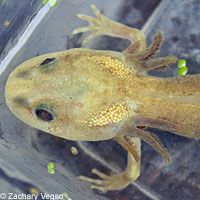 |
|||||||||||
| This leucistic or amelanistic paedomorph adult Northwestern Salamander was found in Humboldt County. Notice the prominent parotoid glands. © Zachary Vegso |
||||||||||||
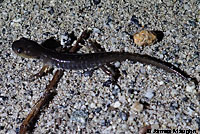 |
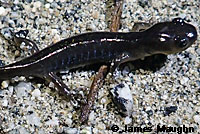 |
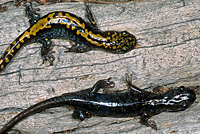 |
||||||||||
| This dark and nearly unmarked adult Santa Cruz Long-toed Salamander was observed in Santa Cruz County. © James Maughn | Normally-pigmented (top) and Melanistic (bottom) Southern Long-toed Salamanders. |
|||||||||||
 |
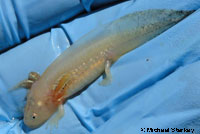 |
 |
 |
|||||||||
| Light-colored morph California Tiger Salamander larva from a turbid pool in Solano County © Marcia Grefsrud/CDFW Grefsrud told me that CTS researchers Trenham and Searcy have noticed light-colored morph larvae in turbid water and darker morph larvae in clear water. |
Pale, possibly albino, California Tiger Salamander larva, Alameda County, seined by Permitted biologists. © Michael Starkey |
"Blonde" Southern Long-toed Salamander larva, about 8,300 feet elevation (2530m.) Nevada County © Carrie Johnson | ||||||||||
Climbing Salamanders (Aneides) |
||||||||||||
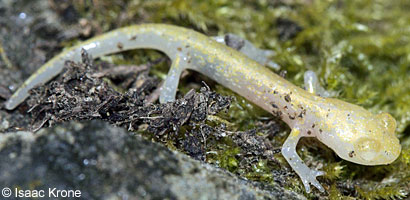 |
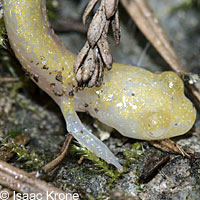 |
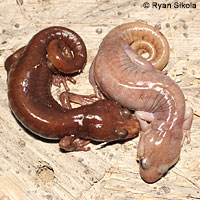 |
||||||||||
| Albino juvenile Speckled Black Salamander found in Mendocino County © Isaac Krone | These unusualy-pigmented adult Arboreal Salamanders were found together in San Luis Obispo County - Unspotted (left) Leucistic (right) © Ryan Sikola |
|||||||||||
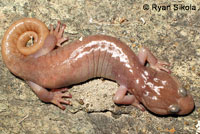 |
 |
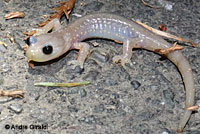 |
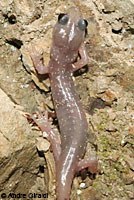 |
|||||||||
| Leucistic adult Arboreal Salamander, San Luis Obispo County © Ryan Sikola | Adult Arboreal Salamander with no light spotting, San Luis Obispo County © Ryan Sikola |
Unusually pale adult Arboreal Salamander, Marin County Andre Giraldi. This salamander is much lighter in color than a typical Arboreal Salamander. Other typically colored salamanders were found near it. It could be missing some of its melanin or dark pigment, or its appearance could be a result of the salamander changing its color from dark to light, which was described by Robert Stebbins. |
||||||||||
Short Video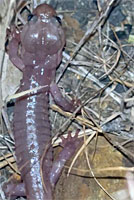 |
 |
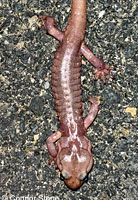 |
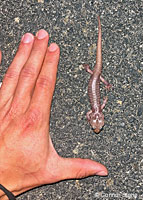 |
|||||||||
| A short video and photos showing a possibly leucistic young adult Arboreal Salamander discovered walking at night in the mountains of Tuolumne County at about 4,975 ft. (1,516 m.) elevation. which is almost at the current elevation record of 5,000 ft. © Connor Stone | ||||||||||||
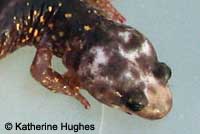 |
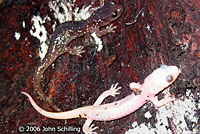 |
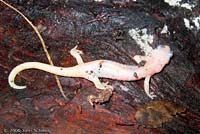 |
||||||||||
| This adult Arboreal Salamander from Santa Clara County has a mottled head. © Katherine Hughes | Top: Typical Arboreal Salamander. Bottom: Pigmentless adult Arboreal Salamander. Both were found in the same general location in Contra Costa County. © 2006 John Schilling |
|||||||||||
Slender Salamanders (Batrachoseps) |
||||||||||||
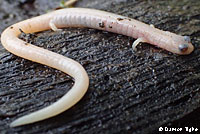 |
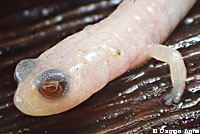 |
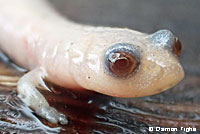 |
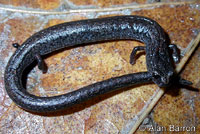 |
|||||||||
| Albino adult California Slender Salamander, Alameda County. © Damon Tighe (The dark areas under the skin above the eyes is not caused by melanin, the dark pigment.) |
Unusually dark, possibly melanistic, California Slender Salamander, Del Norte County © Alan Barron | |||||||||||
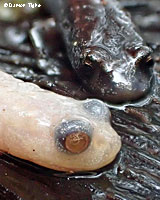 |
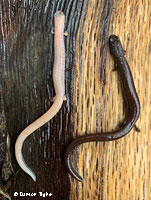 |
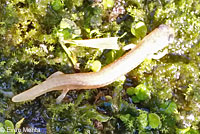 |
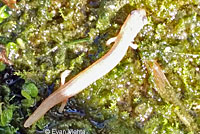 |
|||||||||
| Adult California Slender Salamanders from Alameda County © Damon Tighe Bottom/Left: Albino salamander Top/Right: Normally-pigmented salamander |
This California Slender Salamander (missing most of its tail) appears to lack all pigment, making it either albino or leucistic (the eye color is not known.) © Evan Mehta |
|||||||||||
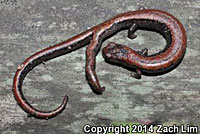 |
||||||||||||
| Adult California Slender Salamander, San Francisco County, with a forked tail. The extra fork probably grew from a break in the tail that did not cause the original tail to detach. © Zach Lim | ||||||||||||
Giant Salamanders (Dicamptodon) |
||||||||||||
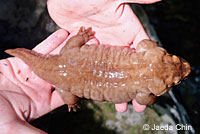 |
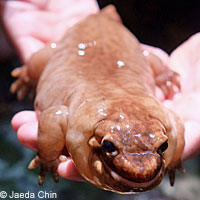 |
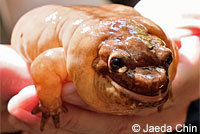 |
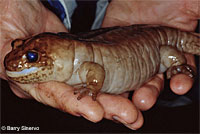 |
|||||||||
| This terrestrial adult California Giant Salamander with an unusual "obese" appearance was found in a pool in a creek in San Mateo County in mid July. (According to salamander experts who have seen these pictures, this condition may be
an extensive subcutaneous edema caused by an infection or from failure, also known as dropsy, or water retention. Or it might be caused by an oxygen consumption problem. © Jaeda Chin |
This terrestrial adult, found in water in Spring in southern Santa Cruz County, shows a similar abnormal appearance to the salamander in the photos to the left. © Barry Sinervo |
|||||||||||
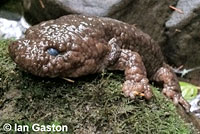 |
 |
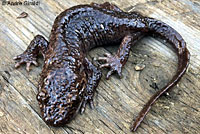 |
||||||||||
| Unusually "warty" neotenic adult California Giant Salamander (about 7 inches in length) found in a stream in Santa Cruz County. © Ian Gaston This condition is likely the result of an infection caused by a parasite. A similar "warty" condition has been found in California Newts found in San Diego County. That condition was also determined to be from disease. "Warty" newts have also been reported on the San Francisco Peninsula. |
This is a smaller less-"warty" aquatic California Giant Salamander from the same area in Santa Cruz County as the one to the left. © Ian Gaston |
This Marin County California Giant Salamander salamander has a "warty" appearance that could be a potential trematode infection. © Andre Giraldi |
||||||||||
Ensatina (Ensatina) |
||||||||||||
 |
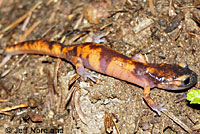 |
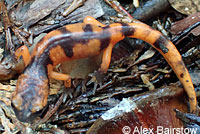 |
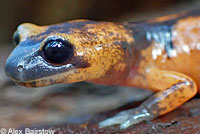 |
|||||||||
| Here you can see two typical subspecies (maybe species) and a hybrid of the two all found in the same part of San Diego County. © Paul Maier Top - Monterey Ensatina Middle - Monterey Ensatina x Large-blotched Ensatina hybrid Bottom - Large-blotched Ensatina |
San Diego County Monterey Ensatina x Large-blotched Ensatina hybrid adult © Jeff Nordland |
San Diego County Monterey Ensatina x Large-blotched Ensatina hybrid adult © Alex Bairstow |
||||||||||
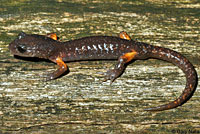 |
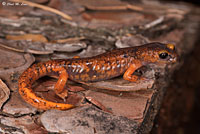 |
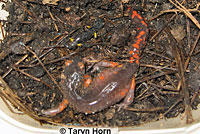 |
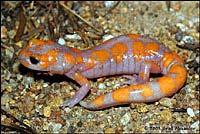 |
|||||||||
| Oregon Ensatina x Sierra Nevada Ensatina, Shasta County | Yellow-eyed Ensatina x Sierra Nevada Ensatina, Calaveras County © Chad M. Lane |
This adult and juvenile were found near Twain Harte in Tuolumne County, which is in the contact or hybrid zone between the Yellow-eyed Ensatina and the Sierra Nevada Ensatina, © Taryn Horn |
Unusually-colored Sierra Nevada Ensatina from the Kern Plateau © 2003 Brad Alexander | |||||||||
 |
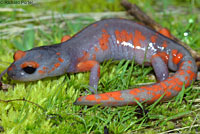 |
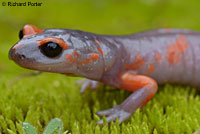 |
||||||||||
| © David Thompson This pale adult Sierra Nevada Ensatina was found in Placer County not far from the range of the Yellow-eyed Ensatina, so its unusual appearance might be due to intergradation or hybridization. |
Unusually-pigmented adult Sierra Nevada Ensatina, El Dorado County © Richard Porter |
|||||||||||
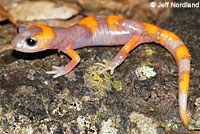 |
 |
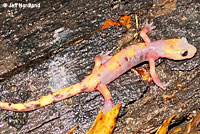 |
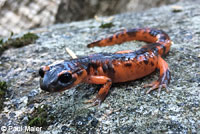 |
|||||||||
| Hypomelanistic adult Large-blotched Ensatina, San Diego County © Jeff Nordland |
Piebald juvenile Large-blotched EnsatinaSan Diego County © Jeff Nordland |
Piebald adult Large-blotched Ensatina, San Diego County © Jeff Nordland |
San Diego County Monterey Ensatina x Large-blotched Ensatina hybrid adult © Paul Maier |
|||||||||
 |
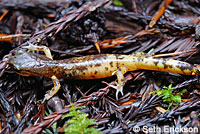 |
 |
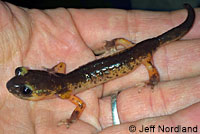 |
|||||||||
| Aberrantly-pigmented adult Painted Ensatina, Del Norte County © Seth Erickson |
San Diego County Monterey Ensatina x Large-blotched Ensatina hybrid adult San Diego County © Jeff Nordland |
|||||||||||
 |
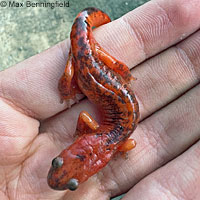 |
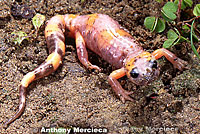 |
||||||||||
| This adult with unusual dark blotches on the skin was found in southern Marin County. © Max Benningfield | San Diego County Monterey Ensatina x Large-blotched Ensatina hybrid adult © Anthony Mercieca |
|||||||||||
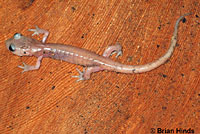 |
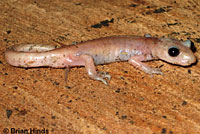 |
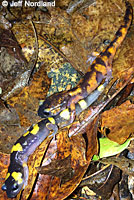 |
 |
|||||||||
| Pale, probably Leucistic, Adult Monterey Ensatina, San Bernardino County. © Brian Hinds |
Hybrid or intergrade E. e. eschscholtzii, (Top) with a typical Large-blotched Ensatina (Bottom). Mt. Palomar, San Diego County © Jeff Nordland |
This Monterey Ensatina photographed near Big Sur in Monterey County, appears to be partially Leucistic. © Christian Gaylord |
||||||||||
Pacific Newts (Taricha) |
||||||||||||
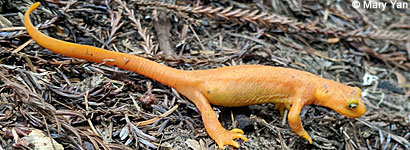 |
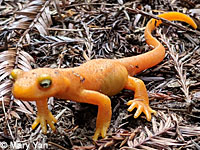 |
|||||||||||
| This unusually pigmented adult California Newt was photographed in Santa Cruz County © Mary Yan. It appears to be missing its dark pigment, but the eyes are dark so it's not an albino, it's leucistic or maybe hypomelanistic. |
||||||||||||
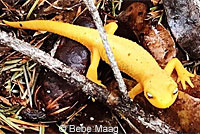 |
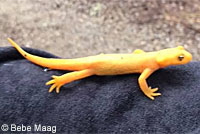 |
 |
||||||||||
| This apparently leucistic juvenile Rough-skinned Newt was found in Santa Cruz County © Bebe Maag | This unusually-colored Rough-skinned Newt, photographed in a shallow creek on the northern Sonoma County coast, has gray skin, black bumps on its back (its "rough skin"), and there is a little bit of the natural color remaining on some of its toes and behind at least one of its legs. (What looks like a split in the tail, is probably the top of the dorsal fin seen from directly above.) © Dorothy Yerxa | |||||||||||
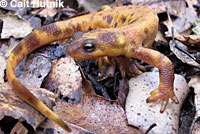 |
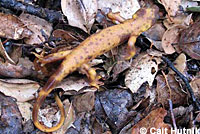 |
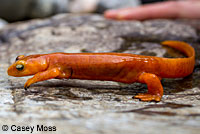 |
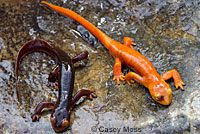 |
|||||||||
| This unusually pale-skinned blotched California Newt was found in Santa Clara County © Cait Hutnik (See more pictures of this newt on Cait's website.) |
Hypomelanistic adult Sierra Newt in breeding phase, Mariposa County © Casey Moss |
Hypomelanistic adult Sierra Newt (right) Typically-colored adult Sierra Newt (left) Both in breeding phase, Mariposa County © Casey Moss |
||||||||||
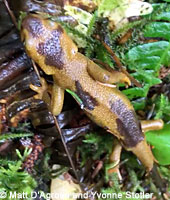 |
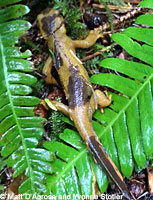 |
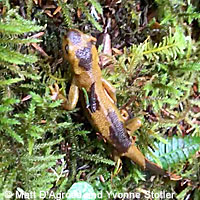 |
||||||||||
| This unusual Rough-skinned Newt with a light ground color and dark blotches, was found near the coast in Tillamook County, Oregon in an area with many other typically-colored newts. © Matt D'Agrosa and Yvonne Stotler | This is a short video of the newt described to the left. © Matt D'Agrosa and Yvonne Stotler |
|||||||||||
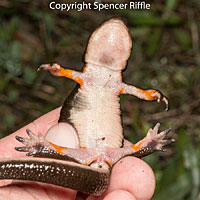 |
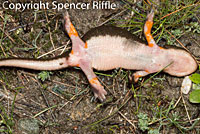 |
 |
||||||||||
| Adult Rough-skinned Newt with an unusually pale venter that could be due to an auto-immune issue. © Spencer Riffle | (For comparison with the photos to the left, this is a Rough-skinned Newt with a normally-pigmented venter) |
|||||||||||
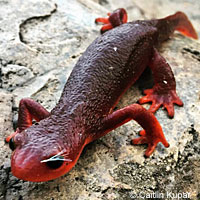 |
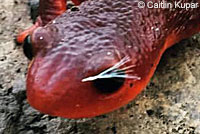 |
 |
||||||||||
| This adult newt has all black eyes. It was found just north of the Middle Fork of the Kaweah River in Tulare County, where newts have been identified as mostly the California Newt, but since it is in the hybrid zone with the Sierra Newt, it could be either species or a hybrid. Both of these species typically have patches of gold coloring in the eyes. © Caitlin Kupar | ||||||||||||
Miscellaneous Genera |
||||||||||||
 |
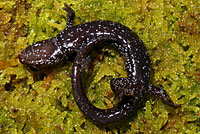 |
|||||||||||
| Melanistic adult Western Red-backed Salamander, Lewis County, Washington | ||||||||||||
Return to the Top
© 2000 -
